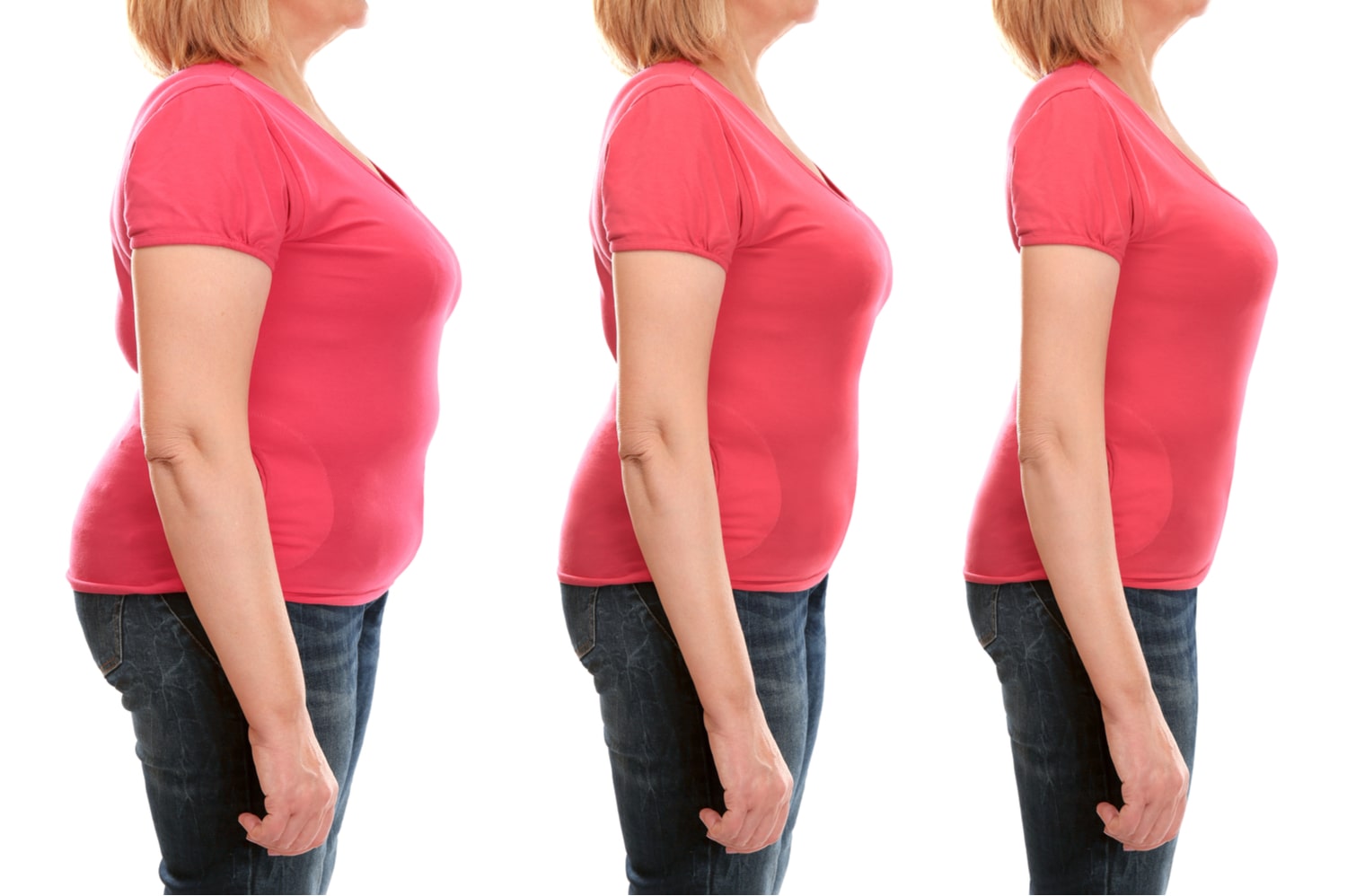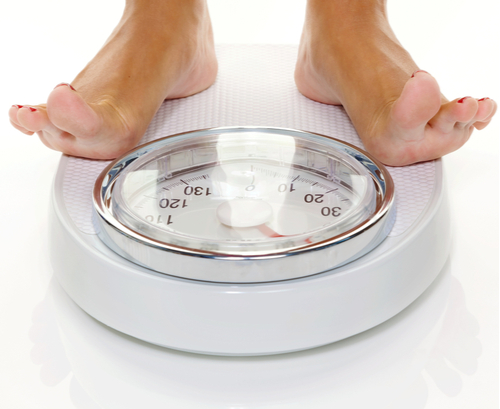How to Lose Weight After 45 Years And What Holds You Back
Even if you were never overweight, you can easily gain up to 10 additional kilograms during the period from 45 up to 53 years. Unfortunately, this is normal as shown in the research “Reproductive and Appetite Hormones and Bulimic Symptoms during Midlife: Bulimic Symptoms during Midlife“. But if you were prone to getting extra fat, it might become even worse by the middle of your fifth decade. There are several reasons for that, which include a slower metabolism, losing muscles, and of course, menopause. On average, women go through menopause at the age of 51-53. However, starting from the age of 45 and even earlier, many have so-called perimenopause, which is the period of preparing for menopause when the concentration of certain female hormones decrease, the egg count gradually drops down, and the reproductive function is gradually shrinking. In addition to health changes, these transformation affects how our bodies absorb the received calories, metabolism, and, accordingly, our weight. And although, for the moment, we cannot stop menopause, we can make an impact on at least some of its symptoms, including gaining extra weight.

Why Do We Gain Weight During Menopause
Progesterone and estrogen are the two main female hormones, whose production gradually decreases after the age of 45. Each of them fulfills many different functions. For example, estrogen supports the density of bones, regulates the balance of good and bad cholesterol, protects heart and blood vessels, and increases the susceptibility of cells to insulin. When the level of estrogen is low, the cells start to experience problems with absorbing sugar, and the glucose level in the blood rises, as suggested in the research “Diabetes Hits Women Hard at Menopause“. The body reacts to the danger and tries to get rid of extra sugar, urgently transforming it into fats.
But this is not all. Body fat produces leptin, which is the hormone responsible for feeling hunger. The higher is the level of leptin, the fuller we feel. But the level of leptin is influenced by the level of estrogen, and when we don’t have it enough, the level of leptin will drop as well, and we will feel hunger sooner. Besides, the level of leptin affects our food habits. Without knowing it, we would prefer foods with higher calories, which would lead to getting extra weight.
Another reason why women gain extra weight faster during menopause and perimenopause is problems with sleep. Among other things, a low level of estrogen negatively affects the quality of night’s sleep. At the same time, insufficient rest contributes to gaining extra weight according to the research “Acute partial sleep deprivation due to environmental noise increases weight gain by reducing energy expenditure in rodents“.
Why You Should Control Weight During This Time
At first glance, two, four, and even eight extra kilograms seem not a big deal, especially if you have never had issues with extra weight before. In the worst scenario, you may think that all you have to do is to get new clothes or change your style a little.
Alas, this is not the case. The extra weight gained during menopause is dangerous for your health.
According to the research “Understanding weight gain at menopause“, during this time, both the proportion of the fat in the body and share of visceral fat, which accumulates in the area of your waist and envelops the internal organs, increase at the same time. This condition can lead to obesity of internal organs and other internal dysfunctions.
So even if the scales show your usual figures or if your weight has increased by just a few pounds, then, most likely, the ratio between fat and muscles has changed in favor of fat. And this fat is really dangerous.
How to Lose Weight After 45
Making the long story short, the strategy includes three equally essential components. They are nutrition, physical activity, and a way of life.
Move it!
Generally speaking, after each year of life, regular physical exercise becomes even more important. After the age of 40, when our metabolism slows down, the muscle ratio in the body decreases, and the cardiovascular and endocrine systems become particularly vulnerable, exercise becomes particularly vital. Naturally, physical exercise is an integral part of any weight-loss strategy, including the period of menopause. Moreover, it is recommended to have both anaerobic and resistance workouts. Thus, according to the research “Effects of a High vs. Moderate Volume of Aerobic Exercise on Adiposity Outcomes in Postmenopausal Women“, anaerobic exercises are especially effective for burning extra kilograms with menopausal or postmenopausal women. Meanwhile, training three times per week during 15-20 minutes is great for burning fat around your belly and preventing loss of muscles according to the research “Sixteen weeks of resistance training can decrease the risk of metabolic syndrome in healthy postmenopausal women“.
According to the recommendations for physical activity , exercising for 150 minutes per week is optimal for women aged 40-50 years. Moreover, if you were not doing any exercise by now, it is recommended to start with a mild type of exercise such as walking (gradually increasing the speed and time), yoga, and swimming. Start from simple exercise, gradually increasing the intensity and duration of workouts.
How to Eat Properly?
If you want to lose weight, your body shall burn more calories than it consumes. And while it is possible to burn a considerable amount of extra calories through exercise, it is also possible to cut on the other share by reducing your diet’s calorie content. A large two-year study, “Safety of two-year caloric restriction in non-obese healthy individuals” has confirmed that it is safe to cut no more than 25% of daily calorie intake. Considering the natural slow down in metabolism starting after the age of 40, it is safe to cut at least 10 or even 15 percent of calories. Another essential part of the strategy is transforming your diet. If you are doing a resistance workout and try to keep your muscle mass at least at the same level (or even increase it), you should eat more protein-containing foods. Proteins are the primary construction material for muscle fibers and a great help for losing weight. Thus, the research of the Medical School of the University of Washington “A high-protein diet induces sustained reductions in appetite, ad libitum caloric intake, and body weight despite compensatory changes in diurnal plasma leptin and ghrelin concentrations” has confirmed that it is possible to lose up to 5 kg during 12 weeks just by simply increasing the amount of proteins in your diet. The diet of those who have succeeded included 30% proteins, 20% fats, and 50% complex carbs. The authors of another study, “The role of protein in weight loss and maintenance“, published in the year 2015, confirm that the protein diet is effective for losing weight. They also state that consuming 1.2-1.6 grams of protein per each kilogram of body mass allows to reduce appetite, decrease the desire to eat between meals, and make it easier to control weight. It also helps to burn fat while keeping the muscle.
It is also essential to decrease the percentage of carbohydrates, especially quick carbs. The portion of bakery products, polished rice, starch-containing vegetables, and sweets in your diet should be reduced to a minimum. First of all, it is essential for controlling the glucose level in the blood and keeping the sensitivity of cells to insulin (Low-carbohydrate-diet score and risk of type 2 diabetes in women). Secondly, the low-carb diet is considered the most effective, as evidenced by the research, “Carbohydrate Restriction has a More Favorable Impact on the Metabolic Syndrome than a Low Fat Diet“. Even in the absence of exercise, simply reducing the share of carbohydrates by 20% allows to lose up to 10 kilograms of extra weight.
Rest Is the Priority!
A good night’s sleep should be one of the important priorities at this time. First of all, a good night’s sleep (not less than 7-8 hours of uninterrupted sleep with a sufficiently long stage of deep sleep) is essential for health. Secondly, as mentioned above, the absence of night’s sleep leads to gaining extra weight, slowing down metabolism and even developing certain eating disorders. According to the research “Sleep, Health, and Metabolism in Midlife Women and Menopause“, many women who go through menopause develop various sleeping disorders, but they must be addressed. And while you should consult with your physician if you should take some supplements or have a substitution therapy, we can just remind you about useful night’s habits as well as digital and lighting hygiene.
Try to keep the temperature in your bedroom low enough and keep it dark. Avoid gadgets and any other devices emitting blue light at least two hours before sleep. It would be great if you can walk in the morning for at least half an hour since morning sunlight helps activate the production of melatonin and positively affects our metabolism. It is better to avoid caffeinated drinks in the second half of the day and limit your physical activity during this time. Finally, try to maintain lighting hygiene, especially in the darker season of the year: stay longer under natural light during the day and dim the artificial lighting in the evening one-two hours before going to bed to avoid blocking the release of the sleep hormone melatonin.
How to Keep Weight After 45 Years

There are high chances that you will gain some extra kilograms during the period between 45 and 55 years. Most likely, you will lose some muscle and gain some fat. It is an entirely natural process related to preparing and going through menopause, experienced by most women. But there is no reason to stop taking care of your health during this time while controlling your weight is not only possible but also necessary. Your secret weapons are moderate exercise, new eating habits, and, most importantly, staying calm and having a good sleep. You know, 45 years of age is when life just begins, so please keep this in mind!
Learn more about SUPPLEMENT+, Weight
What to learn more? Read here:





